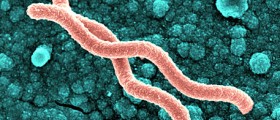Dyspepsia, also known as an upset stomach or indigestion, is a medical term that generally describes discomfort in the upper abdomen. Dyspepsia isn't a disease, but rather a collection of symptoms that is experienced. Dyspepsia can be a symptom of another disease of the digestive tract.
Causes
Dyspepsia can be caused by numerous issues such as medication that's being used, but most of the time it's triggered by lifestyle choices regarding the types of beverages and foods that are consumed. These causes include the following:
- Eating too quickly or too much at a time.
- Consuming spicy, greasy or fatty foods.
- Taking in products that contain alcohol, too much caffeine, chocolate or carbonated drinks.
- Smoking.
- Certain medications such as iron supplements, corticosteroids, anti-inflammatories and antibiotics.
- Increased anxiety and stress.

Symptoms
Dyspepsia can cause one or more of the following signs and symptoms:
- Feeling full early in the meal and not being able to finish.
- Fullness after a meal that's uncomfortable.
- Upper abdominal discomfort.
- A burning sensation in the upper abdomen.
- An uncomfortable bloated sensation in the abdomen.
- Nausea.
- Vomiting or belching, which occurs less frequently.
Diagnosis
The diagnosis of dyspepsia is done by clinical evaluation of the patient, but if the dyspepsia started suddenly, there are severe symptoms or you are older than 55, then the following investigations may be recommended:
- Blood tests to check for metabolic disorders such as thyroid dysfunction.
- Breath and stool tests to investigate for Helicobacter pylori, which is associated with peptic ulcers.
- Gastroscopy to visualize the upper digestive tract and for possible specimen collection through biopsies of tissue.
- Imaging investigations such as X-rays or CT scans to rule out intestinal obstruction.
Management
Incorporating modifications to your lifestyle can help reduce symptoms caused by dyspepsia, such as:
- Eating a larger amount of smaller meals a day instead of less large one.
- Avoiding foods that cause dyspepsia.
- Avoiding pain medications that contain anti-inflammatories.
- Decreasing or stopping the use of caffeine and alcohol.
- Changing medications that lead to dyspepsia.
- Controlling anxiety and stress.
Antacids are usually attempted first to help with dyspepsia, but if they don't work then other options include:
- H2-receptor antihistamines which decrease stomach acid.
- Proton pump inhibitors (PPIs), which need a prescription.
- Antibiotics, to eradicate H. pylori bacteria if they are the cause.
- Prokinetics, which help to empty the stomach faster.
- Anti-anxiety medications or antidepressants to help reduce symptoms of dyspepsia.
Alternative therapies and medicine
These include:
- Caraway and peppermint.
- Relaxation techniques such as meditation, behaviour modification therapy, hypnotherapy and acupuncture.
- STW 5 (Iberogast), which reduces stomach acid levels, is a product that contains extracts of herbs including peppermint leaves, bitter candytuft, liquorice root and caraway.
- www.mayoclinic.org/diseases-conditions/indigestion/home/ovc-20209272
- Photo courtesy of SteadyHealth
















